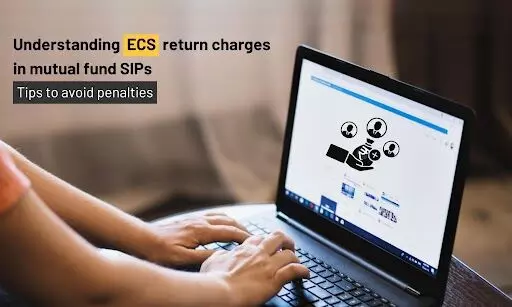Understanding ECS return charges in mutual fund SIPs: Tips to avoid penalties
Learn about ECS return charges in mutual fund SIPs, how they are incurred, and practical tips to avoid them.
Understanding ECS return charges in mutual fund SIPs: Tips to avoid penalties

Investing in mutual funds through a Systematic Investment Plan (SIP) is a popular way to grow wealth over time. For those who have opted for SIPs, you are likely familiar with the process of giving your bank standing instructions to deduct a predetermined sum from your account on a specific date each month. This deduction is facilitated via the Electronic Clearing System (ECS). However, what happens if the transaction fails due to insufficient funds or another issue? This is where ECS return charges come into play.
What is ECS?
The Electronic Clearing System (ECS) is an electronic mode of transferring funds from one bank account to another. When you sign up for a SIP, you essentially authorise your bank to deduct the SIP amount automatically each month. This method isn’t limited to SIPs; it is also widely used for paying utility bills, loan EMIs, insurance premiums, and other recurring payments.
ECS is facilitated by the National Automated Clearing House (NACH), which was established by the National Payments Corporation of India (NPCI). When you give an ECS mandate, you are permitting your bank to debit the specified amount from your account electronically on a predetermined date.
What Happens When an ECS Transaction Fails?
An ECS transaction can fail for various reasons, but the most common one is insufficient funds in the account. When this happens, the bank is entitled to charge a penalty known as ECS return charges. These charges vary from one bank to another, and they can accumulate quickly, especially if you have multiple SIPs or other recurring payments that rely on ECS.
ECS Return Charges: What You Need to Know
ECS return charges are fees imposed by banks or financial institutions when an electronic money transfer could not be completed due to insufficient funds or other issues. These charges are usually a fixed amount, and they can be significant, especially if multiple ECS transactions fail. Here’s a look at how some of the top banks in India impose these charges:
- HDFC Bank: Charges range from ₹450 to ₹550 per failed transaction. For the first instance, the charge is ₹450, which increases to ₹500 for the second instance and ₹550 for the third instance.
- ICICI Bank: Imposes a charge of ₹500 per failed transaction.
- State Bank of India (SBI): Charges ₹295 per failed transaction.
For example, if you have four SIPs running and all four transactions fail due to insufficient funds, and your bank charges ₹620 (including 18% GST) per failed ECS transaction, you would incur a total penalty of ₹2,480 (₹620 x 4).
How to Avoid ECS Return Charges
The best way to avoid ECS return charges is to ensure that you always have sufficient funds in your account at least one day before the SIP or any other ECS-linked payment is due. Here are some practical tips to help you avoid these unnecessary fees:
- Maintain a Buffer in Your Account: Always maintain a buffer amount in your bank account to cover not just your SIPs but also any other potential deductions. This ensures that even if you forget to transfer funds or an unexpected expense comes up, your SIP payments will still go through.
- Set Reminders: Use reminders on your phone or calendar to alert you a few days before your SIP due date. This will give you enough time to transfer the necessary funds if your account balance is low.
- Automate Transfers: If your salary or main income source is credited into a different account than the one used for SIPs, set up an automatic transfer to move funds into the SIP-linked account well in advance.
- Monitor Your Account Regularly: Regularly check your bank account to ensure there are sufficient funds to cover upcoming ECS deductions. Many banking apps offer low-balance alerts, which can be very helpful.
- Choose a SIP Date Wisely: Align your SIP date with your salary or income credit date. For example, if you receive your salary on the 1st of every month, schedule your SIP for the 5th. This allows a few days for the funds to clear and ensures that the balance is adequate.
ECS return charges can quickly add up and eat into your savings if you’re not careful. By understanding how ECS works and taking proactive steps to manage your finances, you can avoid these charges and ensure that your investments continue without any hiccups. Always remember to maintain sufficient funds in your account before your SIP due date to avoid these penalties. Taking these simple steps can save you money and keep your investment journey on track.

